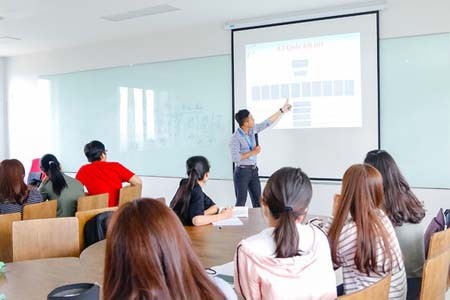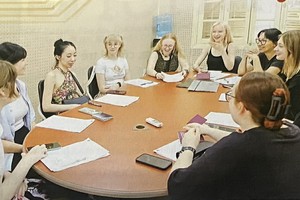
In the recent conference on university entrance examination for the upcoming academic year of 2020, there was a heated debate between representatives of domestic universities and the Higher Education Department (under MOET) regarding high-quality programs in these educational institutes.
According Deputy Director of the Higher Education Department Pham Nhu Nghe, there has been a paradox in current high-quality programs held by universities in Vietnam since freshmen of these programs are those who failed the entrance examination for regular ones. As the name implies, the passing grade for the former must be higher than the latter.
He further commented that if continued, these programs should change their name to premium-service programs instead.
However, representatives of attending universities stated that real passing grades depend on the number of applicants, not their educational level. So MOET should only introduce the minimum passing grade.
Associate Prof. Dr. Do Van Dung, Principal of Ho Chi Minh City (HCMC) University of Technology and Education, shared that existing high-quality programs in universities are merely those with higher services such as comfortable classrooms with air conditioners, better teaching staff, low number of students in each class, and lessons taught in English.
He then cited an example that in order to ensure teaching and learning quality, a normal technical student needs to pay around VND50 million (approx. US$2,180) per year. Nevertheless, several students in Vietnam come from a poor background and cannot afford this, leading to lower training quality. High-quality programs are born for those who are capable of paying these sums and enjoy better teaching conditions, thus their output is logically higher.
"The definition for education quality clearly concentrates on the output of graduates. So MOET should give universities freedom in student admission and curriculum design, providing only the minimum requirements. If these programs are poor, they will be eliminated by both parents and businesses,” said Dr. Dung.
In the conference, many voiced the opinion that certain universities focus too much on attracting people to high-quality programs, lowering the chance for other students entering regular ones.
Dr. Hoang Ngoc Vinh, member of the Consultation Team in the National Committee for Education Reform from 2016-2021, said that high-quality programs in universities are a sensible method to lessen the financial crisis in these educational institutes when learning needs increase day by day, yet the financial conditions cannot satisfy them.
To put it that way, these high-quality programs simply target clients in a higher segmentation and improve the competitiveness for universities against international ones.
One vice principal of a member university of Vietnam National University – HCMC commented that many high-quality programs at the moment cannot meet even quality control standards of regular ones. Therefore, MOET should introduce stricter regulations for curriculum, teaching staff, learning and teaching organization, and local management to ensure these programs can live up to their name. Any program cannot satisfy the regulations should be stopped.
Education is considered a special public service. Hence, the initial assets are normally provided by the Government. Yet without the support from other sources like these high-quality programs, school fees cannot at all tackle the financial shortages and severely affect the development of these institutes as well as learners in a long term.
It seems that a transparent distribution and logical infrastructure re-investment thanks to the financial benefits from high-quality programs are what make both the university and learners happy.
























